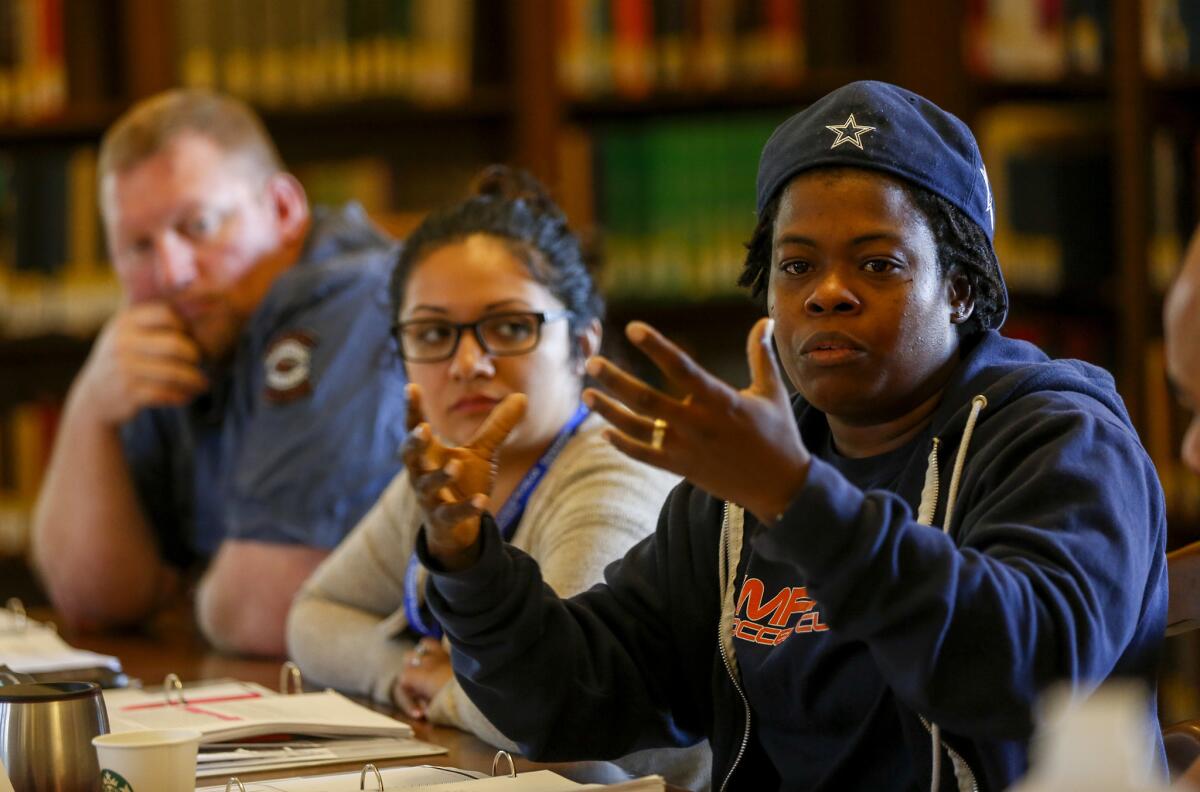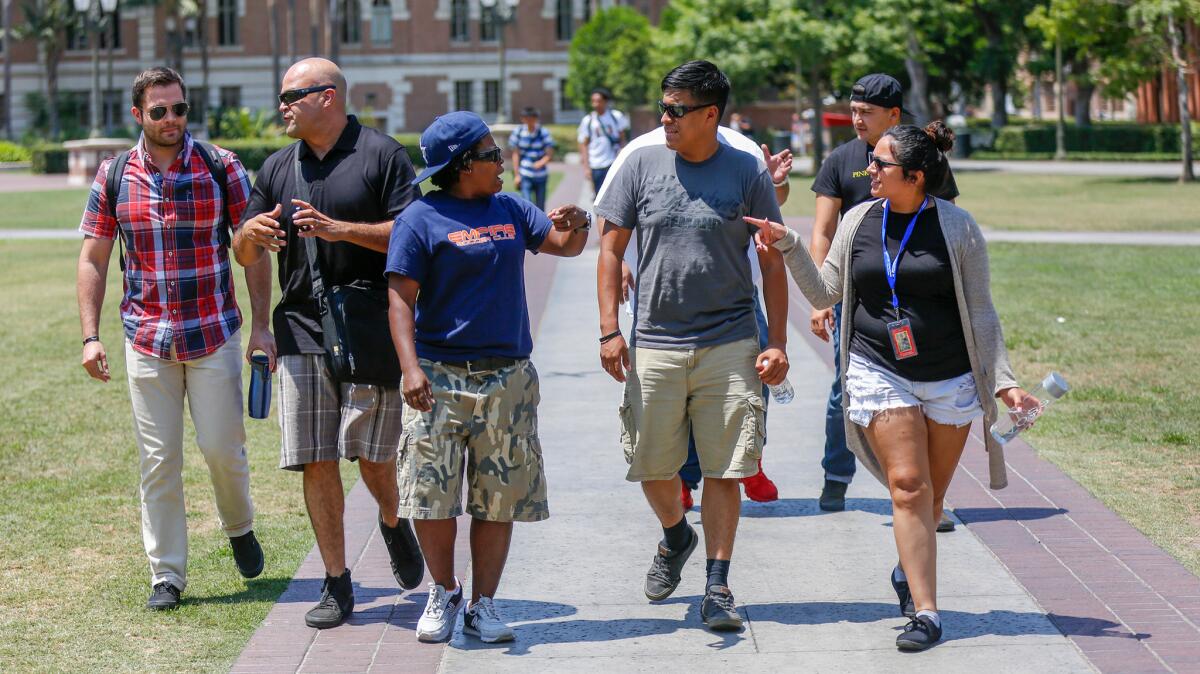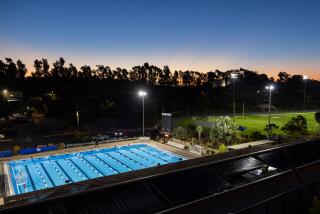USC hosts ‘boot camp’ for military veterans aimed at easing culture shock of college life

- Share via
Charena Lafayette served in the U.S. Marine Corps for 13 years, but no amount of military training prepared her for the challenge of completing a rigorous four-year college program.
How do you analyze an author’s underlying message or frame a thesis in an academic paper? What exactly are you supposed to say in a seminar, and are you allowed to disagree with your classmates? And how do you discuss democracy and foreign policy with 18-year-olds — and socially fit in?
At USC, the Warrior-Scholar Project aims to help veterans like Lafayette hone academic and social skills that may be lacking or forgotten, dissuading many from considering a top-tier school.
Fifteen participants, active-duty and retired, recently completed the weeklong intensive program, which is in its second year at USC, the boot camp’s only West Coast campus. For those who may have put off their academic ambitions for military life, the program teaches them how to adapt to college and study effectively.
The program also aligns with the USC’s mission to encourage more community college students and those who are the first in their family to attend college to consider competitive four-year universities, said Vice Provost Mark Todd.

Veterans and other nontraditional students often spend years chipping away at online courses or taking community college classes that fail to yield a degree. The boot camp, which began last Sunday, immersed participants in a learning environment akin to being full-time students at a university.
“By the time they’re done here, they’ve succeeded in something that they previously thought they wouldn’t be able to succeed at — hanging in there with some of our best faculty in a really rigorous curriculum, on campus, living as a student,” Todd said. USC plans to host the Warrior-Scholar program again next year.
Channeling the familiar structure of military training, seminars run back-to-back for 16 hours a day, instructors drill in “tactical skills” such as note-taking and time management and debriefings focus on the emotional and cultural adaptations critical to succeeding in higher education. The syllabus also includes crash courses on the GI Bill, the admissions process and social do’s and don’ts (off-color humor from the barracks may not go over well with politically correct college students).
“In the military, you’re told where to be, what time to be there and what uniform to wear. It’s all laid out for you,” said Sid Ellington, executive director of the Warrior-Scholar Project, which brings the boot camp to multiple universities each summer.
“To go back to college and be surrounded by 18-, 19- and 20-year-olds who know all the written and unwritten norms — it’s intimidating,” he said. “So we try to fill in those gaps.”
Most nights, Lafayette was up until 2 a.m. in her dorm dissecting classics like Alexis de Tocqueville’s “Democracy in America” and “The Souls of Black Folk” by W.E.B. Du Bois. There are no grades, but mastering the reading assignments was a holy grail for the 36-year-old, who hopes to transfer from Saddleback College to an electrical engineering program at USC or another university. The former Marine Corps sergeant worked as an electrician before retiring from service in 2013.
“We’re used to reading technical manuals. … And this reading right here, this is knowledge,” she said, thrilled with the amount of work she had to do. “This is more than intense. It’s scary. I want to say this is worse than [military] boot camp.”
This is more than intense. It’s scary. I want to say this is worse than [military] boot camp.
— Charena Lafayette
The Warrior-Scholar Project grew from a nine-student pilot in 2012 at Yale University to an annual program at Harvard University, the University of Michigan and nine other campuses. By 2015, more than 260 veterans had received rigorous training from some of the universities’ most esteemed faculty. An additional 230 participants are on track to complete boot camp this summer.
Each camp is run by student veterans and faculty who volunteer to teach a syllabus structured around the theme of democracy. (Two campuses, Yale and the University of Oklahoma, also are testing a STEM curriculum for the first time this year.) The Warrior-Scholar program covers all costs, including room and board, and is funded by the National Endowment for the Humanities and the Bob Woodruff Foundation, among other donors.
Connecting veterans with top-tier schools is crucial to the program’s mission, Ellington said, citing a statistic from a 2015 study by Syracuse University’s Institute for Veterans and Military Families: Since Sept. 11, 2001, veterans make up 1% of all undergraduate students attending a school on the U.S. News & World Report’s list of top 20 colleges and universities.
About 17% of the program’s alumni are now enrolled in these schools, and Ellington hopes that number will grow. When it comes to applicants, he said, “there’s no real criteria, other than we’re looking for how badly somebody wants to go through this very difficult program.”
At USC, sessions began at 6:30 a.m., and the university’s 40-hour freshman composition class was crammed into five writing workshops. Prominent professors in law, English and political science agreed to teach two-hour seminars the way they would to USC students. No kid gloves.
“We don’t do them any justice if we bring them here and have them think it’s a breeze,” Todd said.
In William Handley’s English seminar, students sat attentively in a wood-paneled classroom in Doheny Memorial Library, flipping through three-ring binders stuffed with notes as they discussed Abraham Lincoln’s Gettysburg Address.
“Four score and seven years ago — why not just say 87?” Handley asked, launching the class into a discussion on word choice and cadence as well as race and the evolving interpretation of the phrase “all men are created equal.”
“It’s kind of hard to sit here in front of an instructor, and have him say, ‘Tell me what you think.’ In the military, it’s ‘I’m telling you what to think,’ ” said Lafayette, who had never taken a discussion-based class before. “You have to put yourself out there and make statements about your readings.”
As the group headed for lunch, two men hung back. Gabriel Barrueta’s third paper of the week was due in a few hours, and the active-duty Army corporal said he wanted more time to analyze the passages he had highlighted in de Tocqueville’s 900-page book.
Jacob Wessel, who’s about to start school at the University of Texas-El Paso after 21 years as a U.S. Army combat engineer, also reached for his notes.
“Coming out of the military, one of the biggest hurdles is not knowing whether I could succeed in an environment like this,” said Wessel, who deployed multiple times to Iraq and Afghanistan. “And being here, talking to the professors that we’ve been able to talk to … you come to realize anything is possible. I can do this.”
Twitter: @RosannaXia
ALSO
He was homeless — but to get help, the rules said he had to prove it
Court supports real estate developer’s right to keep hikers off his land
New political and legal battle is shaping up for California bullet train
More to Read
Sign up for Essential California
The most important California stories and recommendations in your inbox every morning.
You may occasionally receive promotional content from the Los Angeles Times.














